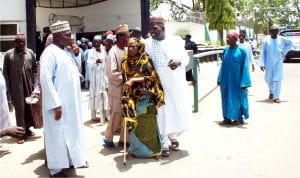Business
Strange Cassava Disease Worries Etche Farmers

Bauchi State pensioners protesting over their unpaid four months entitlements in Bauchi last Friday
Cassava farmers in Etche
Local Government Area of Rivers State are worried over strange death of newly planted cassava crops.
The farmers said most of the crops planted this year died few weeks after sprouting.
While some link the development to heat from the scorching sun, others believe the death is as a result of a strange disease.
Our correspondent who spoke with some of the farmers in Okehi, Afara, Obite, and Mba reports that most of the cassava farmers have started replanting the crops as the ones earlier planted withered off few weeks after they sprouted out.
Mrs Chinyere Nwafor, one of the cassava growers in Mba said, “I am now replanting, my cassava as a result of the disease. I planted in February and about five weeks after the first planting the crop perished. This is double work.
“The problem is that the heat that is killing my cassava crops does not kill the weeds in the farm. So as I replant, I also weed and you can imagine the volume of work”.
Another farmer, Chinedu Amadi, said, “The major implication of the replanting exercise is that one had spent more money to buy the cassava stems to plant.
“The rampant death of the new cassava plants has resulted in scarcity of cassava stems. It is a big setback”.
When contacted, the Chairman, Etche Farmers Co-operative Association. Mr Godwin Akandu, confirmed the development.
He said the development has become a new source of concern for the farmers in the area and feared that it might lead to late and poor harvest.
Etche is noted for cassava production in the state and poor harvest of the crops many believe could cause scarcity of garri in the state.
Chris Oluoh
Business
Fidelity Bank To Empower Women With Sustainable Entrepreneurship Skills, HAP2.0
Business
President Tinubu Approves Extension Ban On Raw Shea Nut Export
Business
Crisis Response: EU-project Delivers New Vet. Clinic To Katsina Govt.
-

 Education4 days ago
Education4 days agoElga boss tasks law students on academics strides
-

 News1 day ago
News1 day agoAmend Constitution To Accommodate State Police, Tinubu Tells Senators
-

 Politics1 day ago
Politics1 day agoSenate Urges Tinubu To Sack CAC Boss
-

 News1 day ago
News1 day agoDisu Takes Over As New IGP …Declares Total War On Corruption, Impunity
-
Business1 day ago
President Tinubu Extends Raw Shea Nuts Export Ban To 2027
-
Business1 day ago
Crisis Response: EU-project Delivers New Vet. Clinic To Katsina Govt.
-

 Business1 day ago
Business1 day agoPENGASSAN Rejects Presidential EO On Oil, Gas Revenue Remittance … Seeks PIA Review
-
Business1 day ago
FG Pushes Cassava Bioethanol Drive To Boost Industrial Growth

